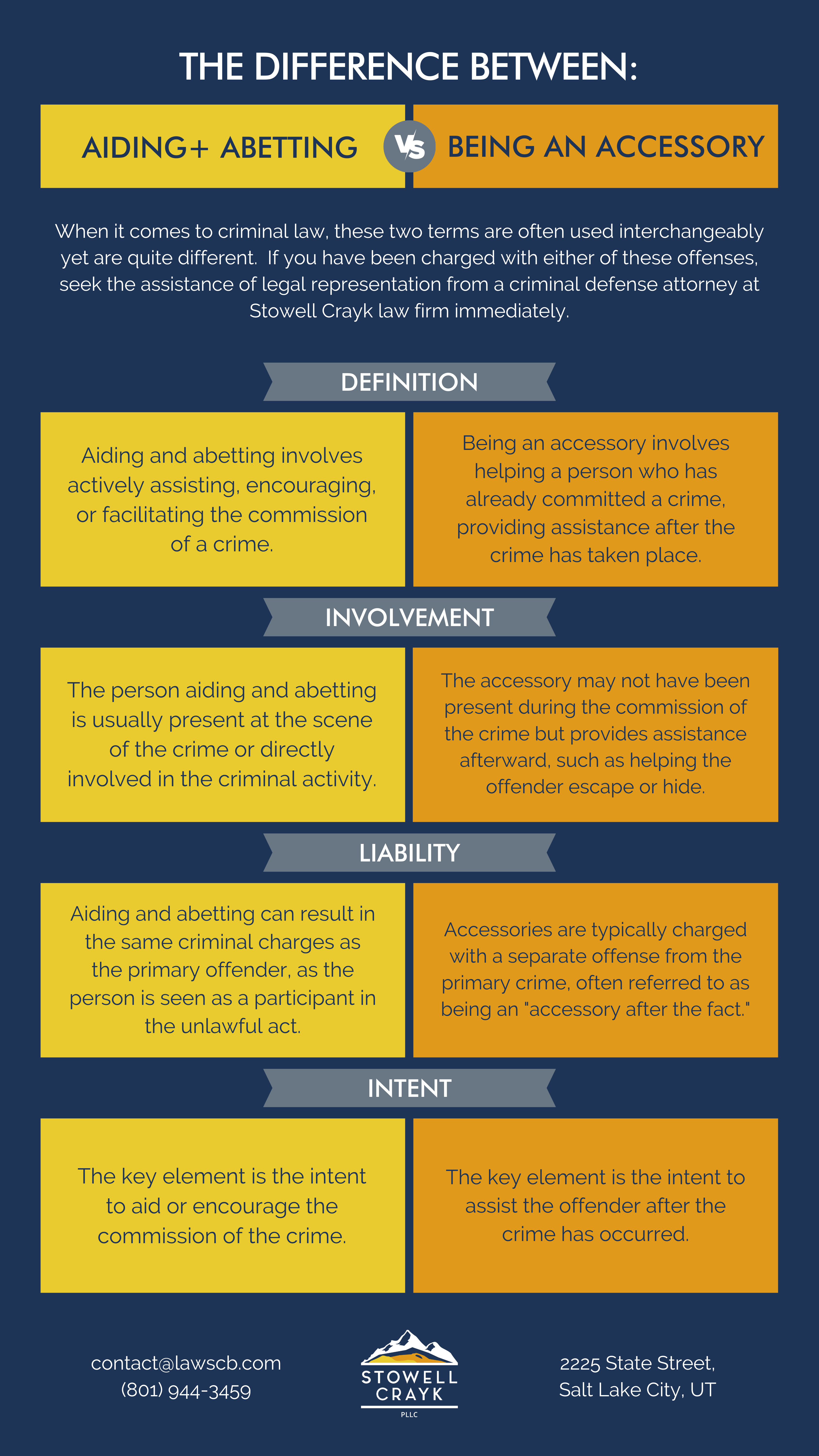When it comes to criminal law, two terms, “aiding and abetting,” and “being an accessory,” are often used interchangeably yet are quite different. Recognizing and understanding their differences is of great importance as they carry unique implications for individuals charged for such criminal activities. This blog provides the correct definitions of these legal terms, explaining the terminology and consequences. If you have been charged with either of these offenses, seek the assistance of legal representation from a criminal defense attorney at Stowell Crayk law firm immediately.
Aiding and Abetting:
Aiding and abetting represents an active participation in executing a crime by providing assistance, encouragement, or support to the primary offender. However, the key point of this charge is intent, requiring individuals to willfully contribute to the criminal act. Unlike being an accessory, those aiding and abetting are typically present at the scene of the crime or directly involved in its execution.
Definition:
The execution of a crime is actively assisted, encouraged, or facilitated by aiding and abetting.
Involvement:
The person aiding and abetting is usually present at the scene of the crime or directly involved in the criminal activity.
Liability:
For these reasons, aiding and abetting can result in the same criminal charges as the primary offender, as the person is seen as a participant in the unlawful act.
Intent:
The key element is the intent to aid or encourage the commission of the crime.
Legal Consequences:
Individuals charged with aiding and abetting may find themselves facing identical criminal charges as the primary offender. The legal consequences hinge on proving the defendant’s intent to facilitate the crime. Penalties may encompass fines, probation, or imprisonment, contingent on the severity of the crime committed. It is crucial to note that aiding and abetting laws exhibit variations across jurisdictions, underscoring the importance of consulting with a knowledgeable criminal defense attorney to navigate the intricacies of each case.
Being an Accessory:
Being an accessory involves providing assistance after a crime has been committed, such as aiding the offender’s escape or concealment. Yet, the critical distinction lies in the timing and nature of involvement. Accessories may not have been present during the commission of the crime but are held accountable for intentionally aiding the offender post-crime.
Definition:
The aiding of a person who has already committed a crime involves being an accessory, and providing assistance after the crime has taken place.
Involvement:
The accessory may not have been present during the commission of the crime but provides assistance afterward, such as helping the offender escape or hide.
Liability:
Accessories are typically charged with a separate offense from the primary crime, often referred to as being an “accessory after the fact.”
Intent:
The key element is the intent to assist the offender after the crime has occurred.
Legal Consequences:
Accessories face a separate offense, known as being an “accessory after the fact.” Consequences may include fines, imprisonment, or both, contingent on the jurisdiction and the specific circumstances of the case. While accessories may not face identical charges as the primary offender, the legal ramifications are nonetheless substantial. Because of this, seeking legal counsel from an experienced criminal defense lawyer becomes imperative to mount a defense strategy.
The Importance of a Criminal Defense Attorney:
Therefore, navigating charges related to aiding and abetting or being an accessory necessitates a comprehensive understanding of criminal law. Stowell Crayk law firm emerges as a beacon of expertise in criminal defense, boasting a team of seasoned attorneys with a wealth of experience in handling cases involving aiding and abetting, accessories, and various criminal offenses.
Expertise in Aiding and Abetting Cases:
Every experienced criminal defense lawyer is well-versed in aiding and abetting cases. They comprehend the nuances of proving intent and the complexities of these charges. With a client-focused approach, they diligently construct a robust defense strategy tailored to each case’s unique circumstances.
Navigating Accessory Charges:
When it comes to accessory charges, adeptness at navigating the legal landscape is the job of your criminal defense lawyer. As a result, the intricacies of post-crime involvement are understood by them, and each case is strategically approached to secure the best possible outcome for clients.
Client-Centered Approach:
A client-centered approach is taken pride in by Stowell Crayk law firm. Consequently, the attorneys prioritize understanding each client’s situation, ensuring open communication, and providing personalized legal guidance. This commitment to client welfare extends to every case handled, fostering a sense of trust and reliability.
Criminal Defense Attorney Defense Strategies:
Crafting an effective defense strategy is paramount when facing aiding and abetting or accessory charges. Our criminal defense lawyers use a multifaceted approach, leveraging our expertise to navigate the complexities of each case. Some common defense strategies include:
1. Challenging Intent:
Disputing the ability to prove intent forms a potent defense. One may argue that the accused lacked the requisite intent to aid or encourage the crime.
2. Questioning Involvement:
In cases of aiding and abetting, we dispute the extent of the accused’s involvement or presence at the crime scene. This can be a viable defense strategy.
3. Establishing Lack of Knowledge:
A defense strategy involves demonstrating that the individual was unaware of the primary crime or had no knowledge of the offender’s actions.
4. Exposing Coercion or Duress:
Using duress or coercion as a defense strategy involves emphasizing that the individual provided assistance under compulsion.
Conclusion:
In the realm of criminal law, precision is paramount, particularly when differentiating between aiding and abetting and being an accessory. The consequences of these charges are significant, underscoring the necessity of expert legal representation. Stowell Crayk law firm, with each criminal defense attorney on our team, offers the expertise required to navigate the complexities of such cases. By seeking our assistance, individuals can ensure a robust defense tailored to our unique circumstances, substantially enhancing the likelihood of a favorable outcome in the face of criminal charges.

